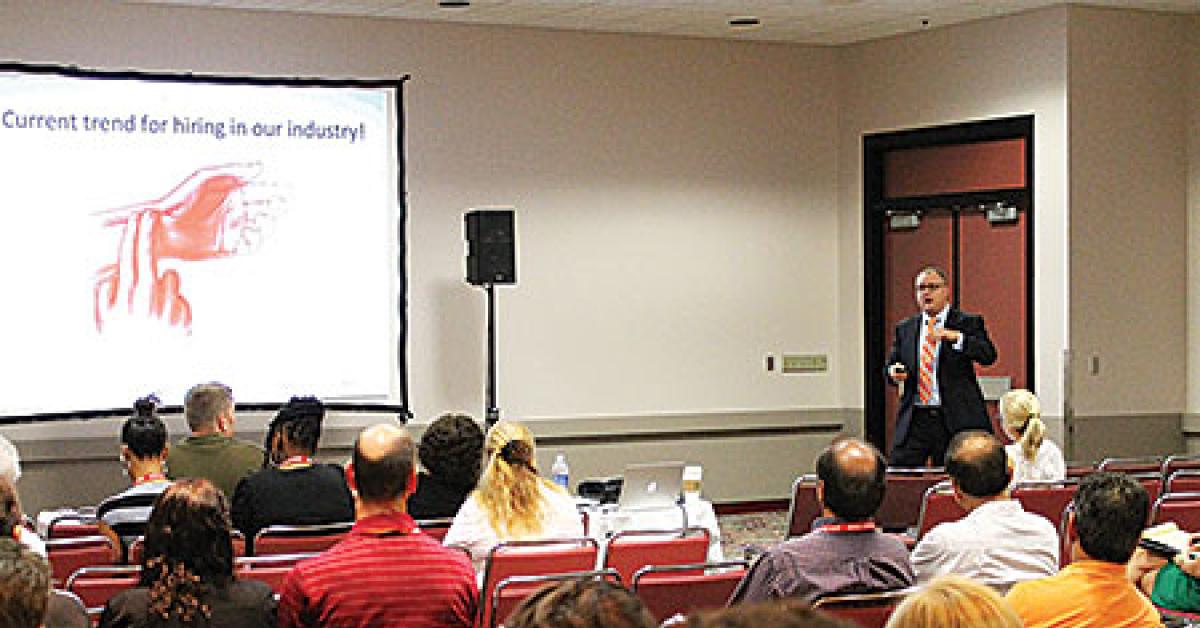JACKSONVILLE, Fla. — It’s not unusual for dry cleaners to invest in their plants, to renovate their physical space or to add equipment or computerization, sometimes at great cost. And from the moment they make such an investment, these items depreciate in value, says Christopher White, executive director of independent drycleaning certification organization America’s Best Cleaners.
But not so with a dry cleaner’s staff. “Everything you buy for your business depreciates once you buy it, except for the humans that you bring [on board]. Humans are the only thing you can appreciate in value. You can develop that asset.”
Speaking to an audience at the South Eastern Fabricare Association’s (SEFA) Southern DryCleaners & Launderers Show, White highlighted the positions in a drycleaning business that directly affect revenue: route personnel and front-counter staff.
As such, you should expect them to interact with your clients in a positive way. “We all have our ‘favorite’ CSR (customer service representative). We just bring them in, and they ‘just work here.’ That’s not what we want. We want superstars. These are the people that ‘touch’ your clients. They represent the values of your brand.”
But all too often, dry cleaners hire someone to fill one of these important positions “if they have a pulse,” says White, who spent 11 years as director of operations for New York-based custom couture cleaner Madame Paulette.
“When do you hire? When the girl quits. When do you hire? When the guy doesn’t show up. You’re scrambling to find someone to fill that void because you don’t want to go to the store, or to have to close that store, or shift managers, or pay overtime for people.”
You should be in hiring mode at all times, he advises. “If you see someone that comes in, looks great and fits your value, find a way to slot them in. … Always be looking for great talent. It’s out there.”
A DESIRE TO SERVE
When interviewing CSR candidates, asking questions about an applicant’s life experience—Do you do any charitable work? Where do you like to shop? What’s the nicest hotel you have stayed at?—can provide insight beyond the standard work experience that every job application asks for, White says.
“Why do I want to know if they do charitable work? It shows their character. Why do I want to know what their favorite restaurant is? What kind of experience are they used to feeling in the service industry?”
Their answers may indicate their willingness and desire to serve others.
The most important attribute to look for in a CSR candidate is a positive attitude. “I’ve yet to find someone who can train that,” White says. “You have to look for that. That’s why we ask those key questions. … the people you put in front of your customers share those values naturally, and then we train them [on] the technical aspects of the business.”
CONSUMER NEEDS
Drycleaning customers have needs that are easy to identify—they want clean and pressed clothes delivered in a timely fashion—but they also have inherent psychological needs—a sense of security, appreciation, and importance—that, if met, can place your company above all others in their eyes.
“We’re one of the few industries where we ‘touch’ our customers once, twice a week, with a very personal item,” White says. “We’re part of their routine. We’re part of their lifestyle. They want to be appreciated. They don’t want conflict. They want you to understand that they’re important to you.”
For example, if your CSRs are not complimenting customers on their garments, you’re missing a huge opportunity to build your relationship with them.
How should you define a client? They are, according to White:
- The most important person in your business
- Not dependent on you
- Not an interruption of your work
- A part of your business
- Not someone with whom to argue or match wits
- The lifeblood of your business
“Every time I ‘touch’ them, I need to earn them,” he says.
Who are your potential clients? They include business professionals, actors, sports figures, entertainers, designers, politicians, tourists, the neighbors next door, and others. “One thing they all have is influence,” warns White, because any subpar experience with your cleaner can become a scathing critique posted to a social network site for all to see.
Check back Thursday for the conclusion!
Have a question or comment? E-mail our editor Dave Davis at [email protected].


